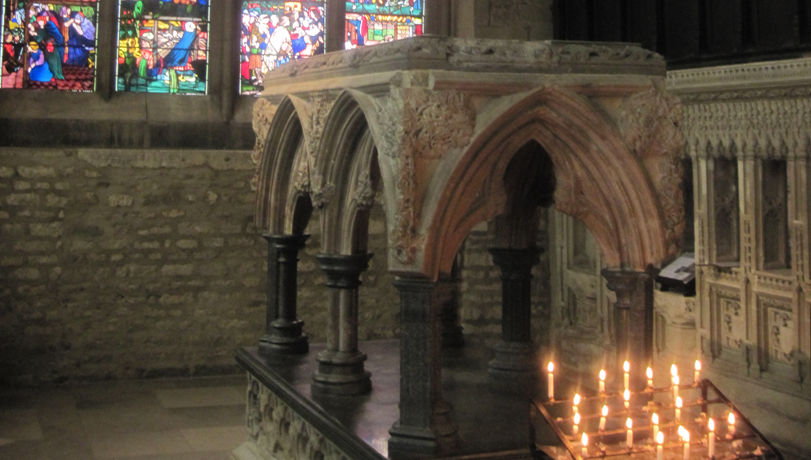 |
| Cistercian power: Rievaulx Abbey |

Aelred was born the son of a priest in 1110, in the Northumbrian town of Hexham. He was for a while a high-ranking official in the court of King David I of Scotland. David endorsed several monasteries in Scotland during his reign and is himself considered a saint. Aelred left Scotland in 1134 to join the quickly growing Cistercian foundation at Rievaulx in northern Yorkshire, deeply inspired by their austerity and isolation. Rievaulx was one of the greatest Cistercian abbeys in England with many acres of farmland, used mainly for sheep grazing, and several hundred brothers and lay brothers. Aelred was Abbot at a Lincolnshire house before he was invited back to Rievaulx to be abbot there. He is known primarily as a historian of English saints, especially those from the north, and of certain royal lines. As a high-ranking ecclesiastic in the north of England, where the cult of saints had been ingrained in local culture since the 7th century, it is not surprising that he recognized the importance of having scholarly hagiographies where the exact details of their holy lives could be recorded and preserved before it was too late. We could perhaps say then that he is the "William of Malmsbury" of 12th century Northumbria. Among his books include "The Life of St. Ninian", "The Life of St. Edward the Confessor" (his most famous), and "The Lives of the Saints of the Church at Hexham." His equally devotional works, "The Mirror of Charity," "Pastoral Prayer," and "On Spiritual Friendship," explore Christian love as exemplified by Christ and the significance of maintaining a devoted and saturated relationship with God in a monastic community.
St. Aelred died on 12 January 1167 and was buried in the chapter house of Rievaulx Abbey, from which his relics were later translated into the church. He was never formally canonized as the custom of Papal canonization was not yet clear in that part of the country (as it is in the Orthodox churches). But his cult was known in England and in French Cistercian communities as a saint.
 |
| Ruins of Rievaulx Abbey quire. |
Collect (From the Episcopal Church):
Almighty God, you endowed the abbot Aelred with the gift of Christian friendship and the wisdom to lead others in the way of holiness: Grant to your people that same spirit of mutual affection, that, in loving one another, we may know the love of Christ and rejoice in the gift of your eternal goodness; through the same Jesus Christ our Savior, who lives and reigns with you and the Holy Spirit, one God, now and for ever. Amen.

No comments:
Post a Comment